BY ELLERY SHEA ’25
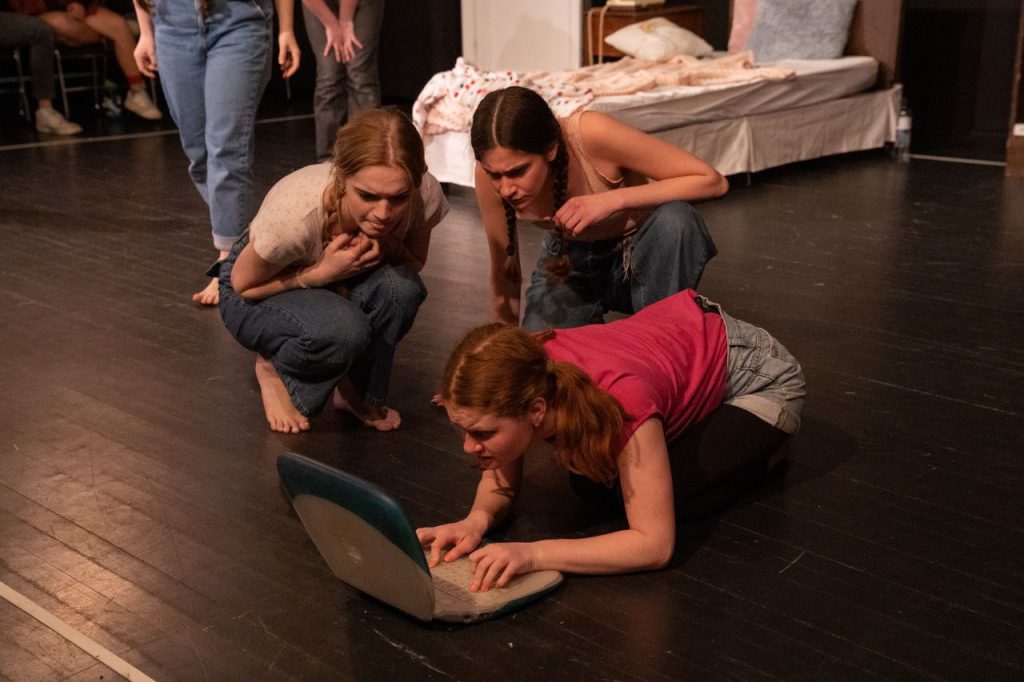
This past week, Skidmore Theater staged its final Studio Lab production of the Spring 2023 season: Horse Girls, by Jenny Rachel Weiner. Directed by Anne Sophie Vandenberk ’23, Horse Girls opened to a packed dress rehearsal in Studio A, full of students who appeared just as excited to see the show as the actors already onstage enraptured within their universe as horse girls.
Senior Directing student Anne-Sophie Vandenberk first read the script for this piece when she was 16 years old and knew that she had to direct it someday. Now 22, Vandenberk eagerly seized the opportunity to direct it as a studio lab production, and has had the pleasure of seeing her vision come alive with an incredible cast and production team to boot! During the Theater Company talk-back last Friday, many members attested to how special it was to work with such a female cast, and the countless ways in which they identified with the young girls within the show, whether it be through their speech patterns, fixations, habits, queerness, or the notoriously multifaceted identity of being a “horse girl.”
For those uninitiated, the phrase “horse girl” has taken on a life of its own in recent years, with many young adults now reminiscing on the phenomena of adolescent girls whose entire personality and existence revolved around their obsession with horses. Don’t get it twisted, though: being a horse girl transcends simply having horse-related fantasies and goes into the realm of horse culture, competitions, country music, and the worship of equestrian celebrities. There is no such thing as a “lowkey” horse girl—the commitment is no joke, a package deal, cutthroat even. Either you’re in the deep end or you’re out.
Regardless of whether or not an audience member once identified as a horse girl, most can agree that the intense passion with which horse girls spun hobby into an all-consuming lifestyle was theatrical in itself. That said, Weiner picked a subject matter that lends itself to spectacle, and oh was this production spectacular! Audience members will herald the compelling actor performances of iconic dances, spirited karaoke, and juicy drama within this show for many seasons to come. The play opens with the nostalgic trumpeting whine of Margaret (Isadora Zucker ’25) practicing her recorder as the other girls of the Lady Jean Ladies horse club play with Breyer horses. Ashleigh (Maggie Krieg ’26), the “president” of the Lady Jean Ladies, suddenly interrupts this peace with her shouting demand for one of the girls to “BRAID HER HAIR!”. The girls all scramble to their feet to conform to this demand, immediately demonstrating the sort of tension that exists within the room.
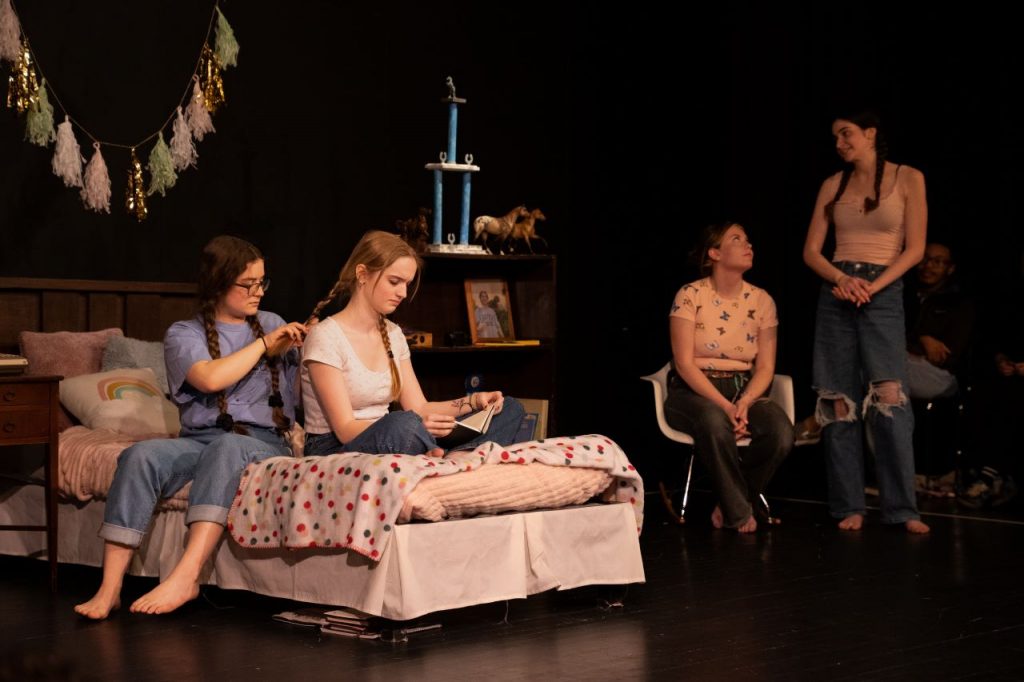
When Camille (Erin Einzig ’23) shows up with her visiting cousin Trish (Mary MacKeen ’23) in tow, audience members get a more formal introduction to the “officers” of the Lady Jean Ladies and the mean girl hierarchy that exists within their organization. First, the audience is introduced to Robin (Kate Hoag ‘23), the eager, people-pleasing secretary of the group. Then, there’s Tiffany (Katherine Gehring ’24), the smart vice president of the group who is constantly overshadowed by Ashleigh and is admittedly a bit jealous of her. As they wait for their final member, Brandi (Willow Forbes ’26), to show up, the group gossips about the boy next door, with other bits of the conversation elucidating the wealth and privilege necessary to be a “successful” horse girl. Ashleigh is clearly on top of the hierarchy because she comes from the wealthiest family. The girls’ contributions to the gossip behave like social currency, yet another demonstration of where they fall within the hierarchy. They grow impatient with waiting for Brandi and eventually start the meeting, beginning with an enthusiastic, yet cultish ceremonial chant: We are one with our horses, we are one with ourselves, we are one with the land, hi ho isn’t it grand!
The girls begin to exchange various happenings within their lives: their club’s Facebook page is gaining traction and Tiffany got into horse camp! This good news is quickly twisted into bad news because Tiffany will be missing four club meetings, which poses a threat to her vice-presidential status within the club. Ashleigh dictates: “If you miss more than two meetings in a row, you are kicked out. We all memorized the book. We all know the rules.” She then criticizes Robin’s braiding ability by prodding her to “watch Margaret braid [her] hair so [she] can see how it’s done.” Even more drama erupts when Ashleigh outs Margaret without any hesitation, practically exhaling that she’s “a total lesbian but everyone knows she braids hair the best in the group.” From her bossiness to the casual outing of Margaret, Ashleigh’s performance is charged with such theatricality, that you get the sense that this character thinks she has an audience beyond newcomer Trish (and since this is theater, she absolutely does!) While Ashleigh bosses the girls around, the girls are very still, in stark contrast to the enthusiasm reflected in their movements beforehand. Nobody wants to upset Ashleigh.
The girls’ conformity to the hierarchy at play is interrupted when Brandi bursts into the room in an incredible sweat, serving as a messenger with grave news: the Lady Jean stables are being sold, and she “overheard a man, a man, a man in a business suit, telling another man, in a business suit, that the horses are not just going to be sold for thousands upon thousands of dollars, taken away from all of us, our stables turned into a mini-mall, but in the middle of the night killed and used for meat.” In the fashion of a Greek tragedy, with Brandi as the iconic messenger, the girls are thrust into a moment of peripeteia.
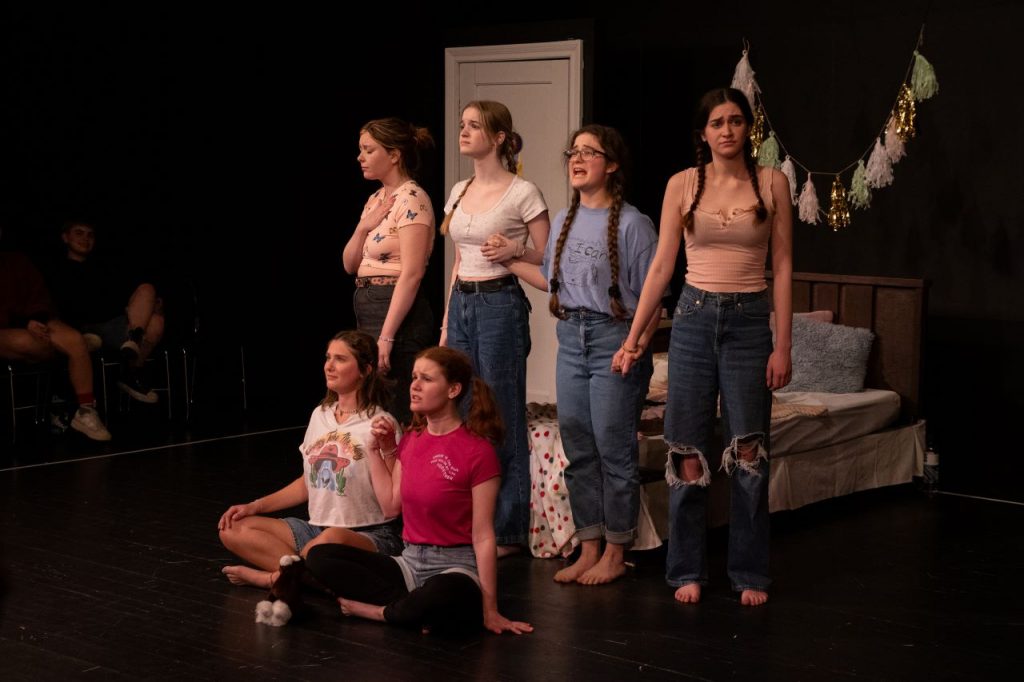
In an outcry of spectacular grief, the girls set aside the pre-existing social tensions within the room and sing a cathartic karaoke rendition of Taylor Swift’s “White Horse.” Then, they mobilize a plan to stop this heinous crime: they are going to “cut the middle man” that lies within typical court procedure and call the first lady of the white house, whom in the year 2014 they believe to be Ann Romney. They then have an untethered karaoke performance of Bette Midler’s “Wind Beneath My Wings” with lyrics modified to worship Ann Romney so that they “call her here in spirit.”
It’s worth noting here just how much the audience was into these karaoke sequences. Even in their chairs, people swayed side to side or bumped their heads, dancing with the characters. While part of it may be the combination of spectacle and nostalgia in a song like “White Horse,” much of the success of these sequences can be attributed to the polished, authentically sleepover-reminiscent choreography within these sequences. Even outside of them, the girls’ manner of inhabiting the room within their own bubbles was very character-specific. During the talk-back at Theater Company, director Anne-Sophie explained the choreography process: they went outside and pretended to be horses, and for the dance sequences they devised dance moves from actors’ instinctive reactions to Taylor Swift’s “White Horse,” giving the movement overwhelming realism. These sequences were no doubt enhanced by the thoughtful decision to stage the performance in a thrust-style stage, in which the audience was made level with the performers, integrating them within the space.
Much of this play’s hilarity hinges upon the fact that there are no adults present to give these girls a reality check, no one to neigh-say their fantasies. Instead, they are isolated within their own universe and confident that they are being completely logical, functioning like a sophisticated young nation with a set hierarchy, akin to the Lord of the Flies. The whimsy of their actions demonstrates their confidence in themselves and belief in change: following their dynamic karaoke performance, the girls call the White House and ask for a direct line to Ann Romney so that their crisis can be resolved. Unsurprisingly, this plan fails for several reasons.
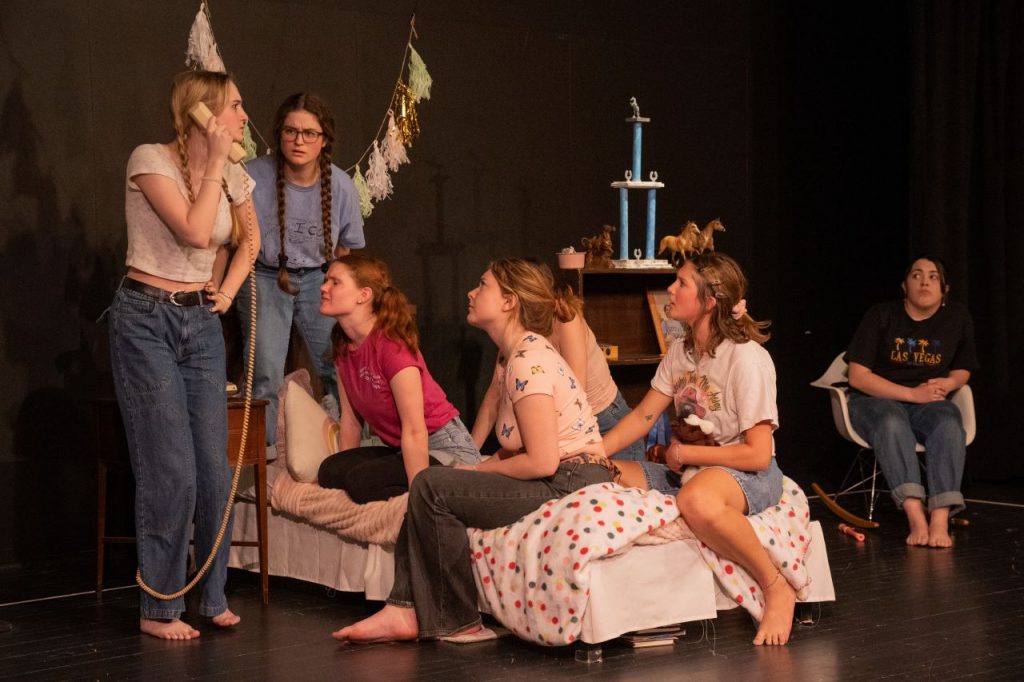
Afterward, Ashleigh gives a morale-boosting speech to the girls and then dismisses them to an ice-pop intermission. As the girls file out, Ashleigh tries to convince Tiffany to sneak into the stables as soon as possible, steal their horses, and ride away. Tiffany is resistant towards the plan to run away because she doesn’t want to leave her sister behind. While Tiffany always has the companionship of her sister to fall back on for support, this moment reveals that Ashleigh feels that she can depend on no one but herself.
When the girls return from their ice-pop intermission, Ashleigh compromises and tries to rally them all together to steal the horses and ride away somewhere anew. Ashleigh’s plan is met with immediate rejection from the entire group. In their time away from Ashleigh, the girls conspired against Ashleigh and mutually agreed to rise against her tyranny. They will not be sticking around, and their moms will be picking them up before the meeting’s official end time.
Ashleigh’s response to their decision is a fury that matches the likes of Helena in A Midsummer Night’s Dream. In response to their betrayal, Ashleigh ragefully monologues for several minutes. In a final display, she lifts her egregiously large horse trophy into the air and declares, “Look at this! Look at what I am!” She continues to shout, “NOBODY IS LEAVING THIS ROOM DO YOU HEAR ME! NOBODY IS EVER LEAVING ME!” At this moment, the play takes a jarring turn from comedy to dark comedy, as whether intentionally or by accident, the reactive chaos within the room results in Ashleigh hitting Trish with the blunt base of the trophy, resulting in her death. While Ashleigh tries to reassure the girls that “she’s just sleeping,” Brandi responds with outrage towards Ashleigh, calling her “crazy” and “a bully.” Then, Ashleigh takes out Brandi with the horse trophy as well.
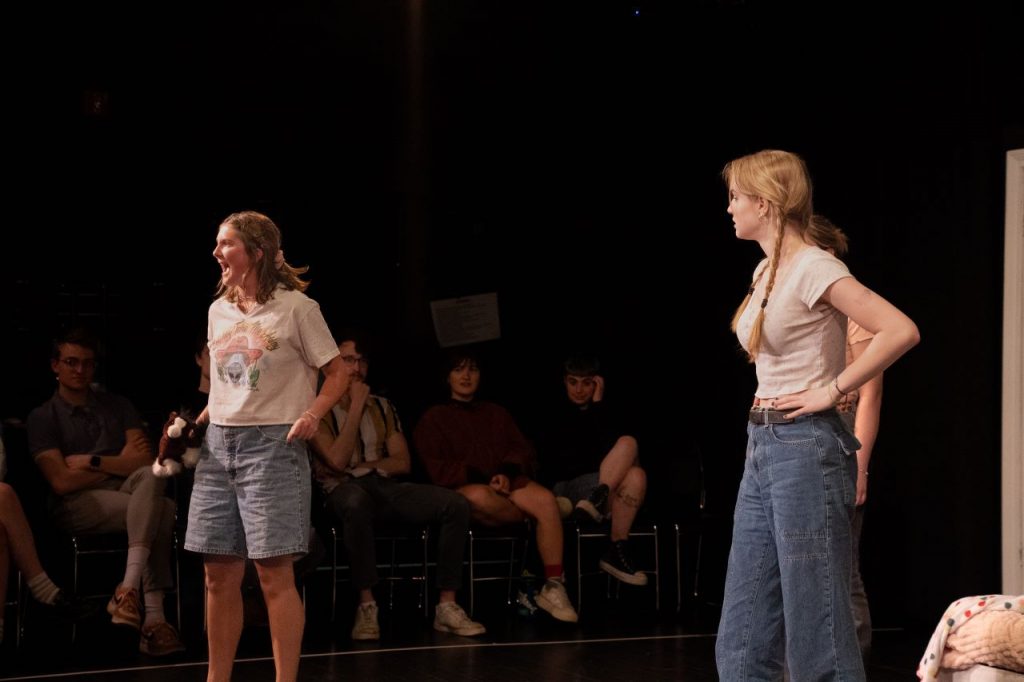
While Ashleigh stares in horror at her actions, Tiffany threatens to call the police. Ashleigh is then saved by Margaret, who strangles Tiffany to death and then declares her love to Ashleigh, pledging her allegiance and promising to run away with her, if that’s still what she wants. Shocked by the spectacle, Ashleigh is moved into a moment of anagnorisis, the moment in the play when Ashleigh discovers the true identity of another character, Margaret. Realizing what she’s done, she begs Margaret to leave “out the back door. That way [she] won’t track blood.” The play ends with Ashleigh asking her housemaid to bring up some warm towels and run a bath for her. To play out the show, there is one more spectacular karaoke performance, and this time it’s “The Climb” by Miley Cyrus. Ashleigh dances over the dead bodies of her former confidants, carefree for just a moment, lip-syncing her heart out to her swan song of Hannah Montana: The Movie fame (a horse girl classic). Just what you expected, right?
After witnessing that jaw-dropping spectacle, some audience members may leave the theater unsettled, and struggle to understand the overall significance of this dark comedy. While it may seem that Ashleigh’s power-driven and trophy-enabled murdering of the other girls at the end of the play is the most overtly violent scene, I would argue that the play’s most injurious moments lie within the weaponization of words and passive verbal violence towards the beginning: Ashleigh’s demands, the outing of Margaret, the upholding of the hierarchy within, and the verbal abuse that precedes the murder. Though the play centers around “horse girls,” the hierarchy that exists within this deceptively cozy space and the girls who haunt it is likely familiar to anyone who survived middle school.
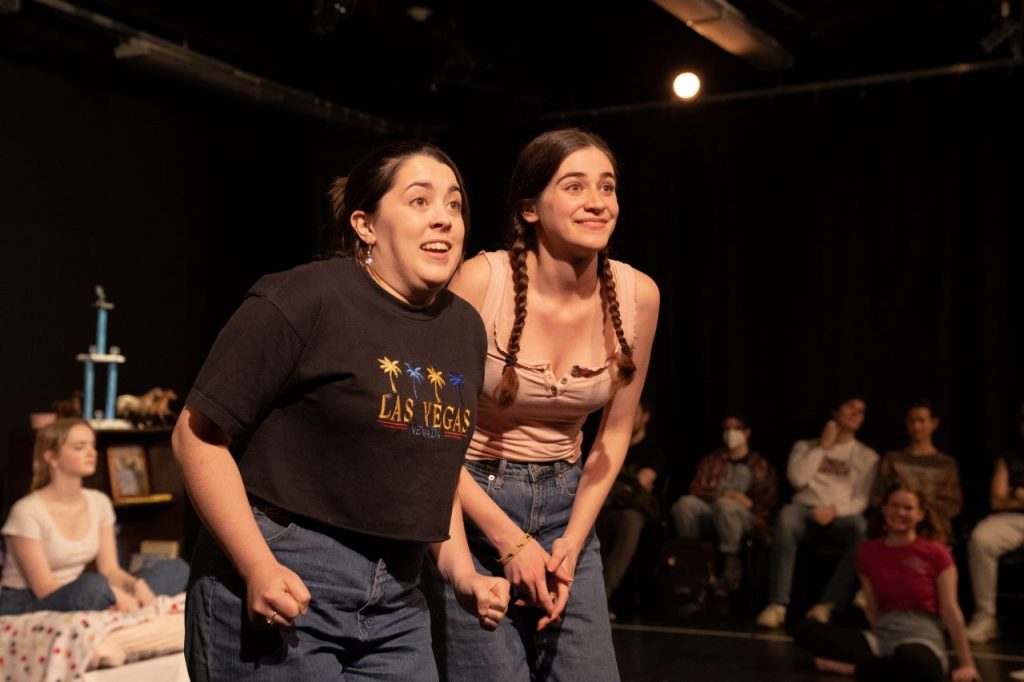
Through the astonishingly dynamic contortions of the spectacles within, Horse Girls manages to preserve the comedy in “dark comedy” by juxtaposing the ugly of the middle school experience with the sheer exuberance and nostalgia of being an obsessive pre-teen surrounded by equally passionate and volatile company. Despite the play ending in murder, this production placed much more of a focus on the hilarious spectacle of these girls’ self-centered warped perceptions of the world that surrounds them, and of course, karaoke. That juxtaposition—the expert execution of both spectacular extremes, even if they’re overexaggerated—is precisely what makes this play so compellingly nostalgic. The script of Horse Girls opens with the phrase, “BoYz may coMe and Boyz mAy Go, bUt hOrSes aRe 4eVer” and in all seriousness, Horse Girls managed to channel so many authentic feelings of nostalgia—both good and bad–into one show, that I am beginning to feel convinced that horses are forever.
Photos by Coltrane Cho ’24
***
Ellery Shea ’25 is a staff writer for the Skidmore Theater Living Newsletter
